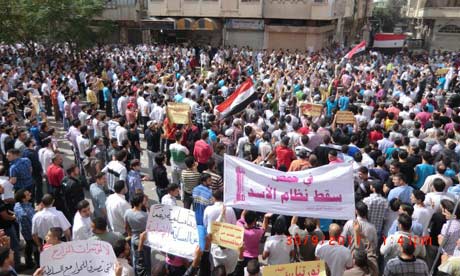UPDATES
Russia and China veto Syria sanctions
October 5, 2011 | Daniel Meyerowitz-Katz

After weeks of controversy over a Palestinian statehood bid of questionable consequence, some in the UN have been attempting to shift their focus onto one of the many situations in the world in which innocent people are being killed on a daily basis. To this end, the UN Security Council attempted to pass a motion to prevent Syria’s ongoing crackdown on dissenting citizens. Initially, the European countries were attempting to sanction Syria through imposing an arms embargo. As Foreign Policy‘s UN correspondent Colum Lynch reports, even a watered-down version of this that merely condemned Syria and did not call for any tangible sanctions was vetoed by Russia and China:
Russia and China today cast a rare double veto to block a U.S. and European-backed draft resolution condemning Syria for its brutal crackdown on protesters, exposing the first major rift in the U.N. Security Council over its response to the wave of popular uprisings that has spread across North Africa and the Middle East.
The draft garnered a paltry 9 votes in the 15-member council, the bare minimum required for adoption of a resolution, as Brazil, India, Lebanon, and South Africa expressed their unease with the Western press for sanctions by abstaining on the vote.
..The council’s European members had initially pressed for a resolution that would have imposed an arms embargo on Syria, and targeted President Assad and more than 20 of his closest associates with a series of sanctions, including a travel ban and a freeze on financial assets.
The watered-down draft resolution blocked by Russia and China today “strongly condemned the continued grave and systematic human rights violations by the Syrian authorities.” It accused the regime of carrying out “arbitrary executions,” torture, and enforced disappearances to end the protests.
The veto sparked a rather strong reaction from Stephanie Rice, the US envoy to the UN.
“The United States is outraged that this council has utterly failed to address an urgent moral challenge and a growing threat to regional peace and security,” said Rice, expressing unusual emotion. “Several members have sought for weeks to weaken and strip bare any text that would have defended the lives of innocent civilians from Assad’s brutality.”
Rice said that the council’s split provided a stark illustration of which countries supported the aspirations of pro-democracy demonstrators in Syria and the rest of the Arab world. “During this season of change, the people of the Middle East can now see clearly which nations have chosen to ignore their calls for democracy and instead prop up desperate, cruel dictators,” she said. “Let there be no doubt: this is not about military intervention. This is not about Libya. That is a cheap ruse by those who would rather sell arms to the Syrian regime than stand with the Syrian people.”
As Jordana Horn reports in The Jerusalem Post, Russia argued that it was attempting to prevent a military intervention in Syria, whereas China justified their decision by arguing that the Council should not be “meddling in Syria’s internal affairs”.
Russian Ambassador Vitaly Churkin told the council that Moscow’s veto reflected “a conflict of political approaches” between Russia and the European council members. Churkin said that Moscow was firmly opposed to the threat of sanctions against Damascus, adding that what he described as the confrontational approach of the European delegations was “against the peaceful settlement of the crisis.” He reiterated his concerns that passing the European resolution on Syria could have opened the door to a Libya-style military intervention in the Syrian authorities’ six-month crackdown on anti-government demonstrations there.
Chinese Ambassador Li Baodong said that Beijing opposed the idea of “interference in [Syria’s] internal affairs.”
As reported by Martin Chulov in The Guardian, while the Security Council has been unable to effectively sanction Syria, neighbouring Turkey has been indicating that it will be taking unilateral measures against the Assad regime. The announcement continues Turkish Prime Minister Reccep Tayyip Erdogan’s move away from Syrian President Bashar al-Assad, who a year ago was considered a close ally of Turkey and a personal friend of Erdogan’s.
“Oppressed, defenceless people are dying in serious numbers,” said Racip Erdogan, the Turkish prime minister . “We cannot say ‘let these deaths continue’.”
Erdogan did not specify the exact nature of the new sanctions but has previously hinted at a range of military and commercial measures.
Erdogan, who has taken a regional lead in condemning Turkey’s restive southern neighbour, compared the actions of Assad to those of his father, Hafez al-Assad, who ordered the Hama massacre in 1982 after an anti-regime rebellion.
Recent weeks have shown that in spite of this year’s Arab revolutions, the Israeli/Palestinian conflict still has the ability to draw the world’s attention away from far more significant conflicts. Were the ever-increasing death toll in Syria receiving half as much coverage as the Palestinian Authority’s recent antics, it would be far more difficult for Russia and China to continue blocking efforts to intervene in Syria, allegedly in order to keep selling arms to the Syrian regime. The true victims of the world’s neglect are the Syrian people while, arguably, the Palestinians are victims of the world’s concern.
Daniel Meyerowitz-Katz
Tags: Asia





